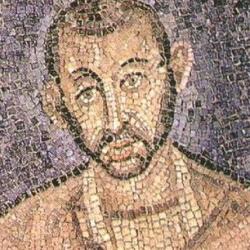
Baptism and Being “Born Again”
. . . born again by baptism; the generation by which we shall rise again from the dead, and shall live with the Angels for ever. (Explanations of the Psalms, 135:13 [135, 11] )
As regards the question of baptism, that our being born again, cleansed, justified by the grace of God, should not be ascribed to the man who administered the sacrament, . . . (Against the Letters of Petilian the Donatist, iii, 50, 62)
Born again, however, a man must be, after he has been born; because, “Unless a man be born again, he cannot see the kingdom of God” [John 3:3] Even an infant, therefore, must be imbued with the sacrament of regeneration, lest without it his would be an unhappy exit out of this life; and this baptism is not administered except for the remission of sins. (On Merit and the Forgiveness of Sins and on Infant Baptism, ii, 43 [XXVII] )
. . . that life of the Spirit, in the newness of which they who are baptized are through God’s grace born again . . . (On Merit and the Forgiveness of Sins and on Infant Baptism, ii, 45 [XXVIII] )
For all persons run to church with their infants for no other reason in the world than that the original sin which is contracted in them by their first and natural birth may be cleansed by the regeneration of their second birth. (On Marriage and Concupiscence, ii, 4)
Baptism and Justification
. . . the question of baptism, . . . justified by the grace of God, . . . (Against the Letters of Petilian the Donatist, iii, 50, 62)
Baptism and Salvation
By all these considerations it is proved that the sacrament of baptism is one thing, the conversion of the heart another; but that man’s salvation is made complete through the two together. (On Baptism, Against the Donatists, iv, 25, 33)
The form of the sacrament is given through baptism, the form of righteousness through the gospel. Neither one without the other leads to the kingdom of heaven. (Against the Letters of Petilian the Donatist, iii, 56, 68)
. . . that sacrament, namely, of baptism, which brings salvation . . . (Letter 98 [1]: To Boniface [408] )
The Christians of Carthage have an excellent name for the sacraments, when they say that baptism is nothing else than “salvation,” and the sacrament of the body of Christ nothing else than life. . . . For wherein does their opinion, who designate baptism by the term salvation, differ from what is written: “He saved us by the washing of regeneration?” [Titus 3:5] or from Peter’s statement: “The like figure whereunto even baptism does also now save us?” [1 Peter 3:21] (On Merit and the Forgiveness of Sins and on Infant Baptism, i, 34 [XXIV] )
. . . being washed by the sacrament and charity of the faithful, and thereby incorporated into the body of Christ, which is the Church, they may be reconciled to God, and so live in Him, and be saved, and delivered, and redeemed, and enlightened. (On Merit and the Forgiveness of Sins and on Infant Baptism, i, 39 [XXVI] )
The baptism of infants . . . is given to them not only for entrance into the kingdom of God, but also for attaining salvation and eternal life, which none can have without the kingdom of God, or without that union with the Saviour Christ, wherein He has redeemed us by His blood. (On Merit and the Forgiveness of Sins and on Infant Baptism, ii, 1 [I] )
For if any one should ask of me whether we have been saved by baptism, I shall not be able to deny it, since the apostle says, “He saved us by the washing of regeneration and renewing of the Holy Ghost.” [Titus 3:5] But if he should ask whether by the same washing He has already absolutely in every way saved us, I shall answer: It is not so. Because the same apostle also says, “For we are saved by hope; but hope that is seen is not hope: for what a man sees, why does he yet hope for? But if we hope for that we see not, we with patience wait for it.” [Romans 8:24-25] Therefore the salvation of man is effected in baptism, because whatever sin he has derived from his parents is remitted, or whatever, moreover, he himself has sinned on his own account before baptism; but his salvation will hereafter be such that he cannot sin at all. (Against Two Letters of the Pelagians, iii, 5)
***
“Please Hit ‘Subscribe’”! If you have received benefit from this or any of my other 4,800+ articles, please follow my blog by signing up (with your email address) on the sidebar to the right (you may have to scroll down a bit), above where there is an icon bar, “Sign Me Up!”: to receive notice when I post a new blog article. This is the equivalent of subscribing to a YouTube channel. My blog was rated #1 for Christian sites by leading AI tool, ChatGPT: endorsed by influential Protestant blogger Adrian Warnock. Please also consider following me on Twitter / X and purchasing one or more of my 55 books. All of this helps me get more exposure, and (however little!) more income for my full-time apologetics work. Thanks so much and happy reading!
***
Infant Baptism
This word of faith possesses such virtue in the Church of God, that through the medium of him who in faith presents, and blesses, and sprinkles it, He cleanses even the tiny infant, although itself unable as yet with the heart to believe unto righteousness, and to make confession with the mouth unto salvation. (Lectures on the Gospel of John, 80, 3)
There is not indeed a man among the faithful, who would hesitate to call such infants believers merely from the circumstance that such a designation is derived from the act of believing; for although incapable of such an act themselves, yet others are sponsors for them in the sacraments. (On Merit and the Forgiveness of Sins and on Infant Baptism, i, 38)
But what shall become of the little ones? For it is beyond all belief that in these days there shall not be found some Christian children born, but not yet baptized, and that there shall not also be some born during that very period; and if there be such, we cannot believe that their parents shall not find some way of bringing them to the laver of regeneration. . . . to seek baptism for their little ones . . . (City of God, xx, 8)
. . . the little ones, who by the laver of regeneration have been freed from the bond of original sin . . . (City of God, xxi, 14)
But such is God’s mercy towards the vessels of mercy which He has prepared for glory, that even the first age of man, that is, infancy, which submits without any resistance to the flesh, and the second age, which is called boyhood, and which has not yet understanding enough to undertake this warfare, and therefore yields to almost every vicious pleasure (because though this age has the power of speech, and may therefore seem to have passed infancy, the mind is still too weak to comprehend the commandment), yet if either of these ages has received the sacraments of the Mediator, then, although the present life be immediately brought to an end, the child, having been translated from the power of darkness to the kingdom of Christ, shall not only be saved from eternal punishments, but shall not even suffer purgatorial torments after death. For spiritual regeneration of itself suffices to prevent any evil consequences resulting after death from the connection with death which carnal generation forms. But when we reach that age which can now comprehend the commandment, and submit to the dominion of law, we must declare war upon vices, and wage this war keenly, lest we be landed in damnable sins. (City of God, xxi, 16)
For from the infant newly born to the old man bent with age, as there is none shut out from baptism, so there is none who in baptism does not die to sin. But infants die only to original sin; those who are older die also to all the sins which their evil lives have added to the sin which they brought with them. (Enchiridion: Handbook on Faith, Hope, and Love, 43)
. . . that one sin, which by one man entered into the world, and so passed upon all men, and on account of which infants are baptized, . . . (Enchiridion: Handbook on Faith, Hope, and Love, 45)
. . . those who by their tender age were unable to believe, but might be absolved from original sin by the sole laver of regeneration . . . (On Rebuke and Grace, 12)
Method or Mode of Baptism
And so also in the epistle which he [St. Cyprian] wrote to Magnus, when he was asked whether there was any difference in the efficacy of baptism by sprinkling or by immersion, “In this matter,” he says, “I am too modest and diffident to prevent any one by my judgment from thinking as he deems right, and acting as he thinks.” By which discourses he clearly shows that these subjects were being handled by them at a time when they were not yet received as decided beyond all question, but were being investigated with great care as being yet unrevealed. (On Baptism, Against the Donatists, vi, 7, 10)
Baptismal Regeneration
“Forgiveness of sins.” You have [this article of] the Creed perfectly in you when you receive Baptism. (Sermon to Catechumens on the Creed, 15)
. . . my initiation and washing by Your life-giving sacraments, confessing You, O Lord Jesus, for the remission of sins. So my cleansing was deferred, . . . (The Confessions, i, 11, 17)
But hast not Thou, O most merciful Lord, pardoned and remitted this sin also, with my others, so horrible and deadly, in the holy water? (The Confessions, ix, 2, 4)
. . . our conversion and regeneration by Your baptism, . . . (The Confessions, ix, 3, 6)
And what is regeneration in baptism, except the being renovated from the corruption of the old man? . . . since we say that he has been baptized in Christ, we confess that he has put on Christ; and if we confess this, we confess that he is regenerate. (On Baptism, Against the Donatists, i, 11, 16)
But the possibility of regeneration through the office rendered by the will of another, when the child is presented to receive the sacred rite, is the work exclusively of the Spirit by whom the child thus presented is regenerated. . . . By the water, therefore, which holds forth the sacrament of grace in its outward form, and by the Spirit who bestows the benefit of grace in its inward power, cancelling the bond of guilt, and restoring natural goodness [reconcilians bonum naturæ], the man deriving his first birth originally from Adam alone, is regenerated in Christ alone. (Letter 98 [2]: To Boniface [408] )
In infants original sin is remitted through baptism, . . . (On Merit and the Forgiveness of Sins and on Infant Baptism, i, 9 [IX] )
Now, inasmuch as infants are not held bound by any sins of their own actual life, it is the guilt of original sin which is healed in them by the grace of Him who saves them by the laver of regeneration. (On Merit and the Forgiveness of Sins and on Infant Baptism, i, 24 [XIX] )
The sacrament of baptism is undoubtedly the sacrament of regeneration . . . (On Merit and the Forgiveness of Sins and on Infant Baptism, ii, 43 [XXVII] )
. . . that which has secured the adhesion of the universal Church from the earliest times— that believing infants have obtained through the baptism of Christ the remission of original sin. (On Merit and the Forgiveness of Sins and on Infant Baptism, iii, 9)
“Who forgives all your iniquities”: this is done in the sacrament of baptism. (On the Spirit and the Letter, 59)
. . . those who have been baptized when they could no longer escape death, and have departed this life with all their sins blotted out . . . (City xiii, 7)
There are two regenerations, . . . the one according to faith, and which takes place in the present life by means of baptism; the other according to the flesh, and which shall be accomplished in its incorruption and immortality by means of the great and final judgment (City of God, xx, 6)
. . . that bath of regeneration, which they might have received and through which they might have been saved . . . (On Nature and Grace, 4 [IV] )
No man is justified unless he believes in Christ and is cleansed by His baptism. (On Nature and Grace, 48 [XLI] )
And this is the meaning of the great sacrament of baptism which is solemnized among us, that all who attain to this grace should die to sin, as He is said to have died to sin, because He died in the flesh, which is the likeness of sin; and rising from the font regenerate, as He arose alive from the grave, should begin a new life in the Spirit, . . . (Enchiridion: Handbook on Faith, Hope, and Love, 42)
. . . the grace of baptism, which is given as an antidote to original sin, so that what our birth imposes upon us, our new birth relieves us from (this grace, however, takes away all the actual sins also that have been committed in thought, word, and deed): . . . in which all our guilt, both original and actual, is washed away, (Enchiridion: Handbook on Faith, Hope, and Love, 64)
Live consistently, especially ye candidates of Christ, recently baptized, just regenerated, . . . (Sermons on the New Testament, 96, 2 [CXLVI] )
*
Practical Matters: I run the most comprehensive “one-stop” Catholic apologetics site: rated #1 for Christian sites by leading AI tool, ChatGPT — endorsed by popular Protestant blogger Adrian Warnock. Perhaps some of my 4,800+ free online articles or fifty-five books have helped you (by God’s grace) to decide to become Catholic or to return to the Church, or better understand some doctrines and why we believe them.
Or you may believe my work is worthy to support for the purpose of apologetics and evangelism in general. If so, please seriously consider a much-needed financial contribution. I’m always in need of more funds: especially monthly support. “The laborer is worthy of his wages” (1 Tim 5:18, NKJV). 1 December 2021 was my 20th anniversary as a full-time Catholic apologist, and February 2022 marked the 25th anniversary of my blog.
PayPal donations are the easiest: just send to my email address: apologistdave@gmail.com. Here’s also a second page to get to PayPal. You’ll see the term “Catholic Used Book Service”, which is my old side-business. To learn about the different methods of contributing (including Zelle), see my page: About Catholic Apologist Dave Armstrong / Donation Information. Thanks a million from the bottom of my heart!
*
***
*
Photo credit: My self-designed cover for the book that I edited (2012) [see book and purchase information]
Summary: I document the views of St. Augustine (354-430) on baptism (particularly baptismal regeneration): all of which are perfectly consistent with Catholic theology.
















